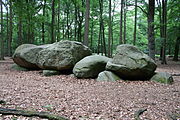Route of Megalithic Culture


Station 32 on the route[1]
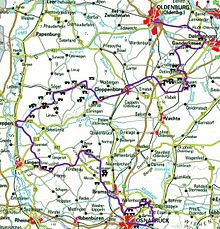
The Route of Megalithic Culture[2][3][4][5] (Template:Lang-de) was first created as a tourist route that meanders from Osnabrück to Oldenburg in North-West Germany. Signposted with brown road signs it links many places of archaeological interest from the Megalithic era.[6]
Signs for the route started going up in 2008 and 2009. The whole 310-kilometre-long route was officially opened on 14 May 2009.[7]
The route links many sites of archaeological investigation and 33 stations where the public can visit archaeological sites, for example, with standing stones.[6][8]
On the 27th of August 2013, the route became part of the Cultural Route of the Council of Europe initiative, with sections in a growing number of countries, including Denmark, England, Netherlands, Portugal, and Sweden.[9]
Route
The founding section of the Route of Megalithic Culture runs through the territories of Osnabrück, Ostercappeln, Belm-Vehrte, Wallenhorst, Bramsche, Ankum, Berge, Bippen, Fürstenau, Freren, Thuine, Lingen (Ems), Meppen, Sögel, Werlte, Lastrup, Cloppenburg, Visbek, Großenkneten, Wildeshausen, Dötlingen, Ganderkesee and Oldenburg.[10]
It is planned to extend the route, on the one side towards North Rhine-Westphalia, and on the other towards northeast Lower Saxony as far as Schleswig-Holstein.[11] The original route in Lower Saxony now forms part of a greater EU initiative with similar routes in Denmark, England, Netherlands, Portugal, and Sweden.[9] In the Netherlands, for instance, there are another 53 megalithic sites.[12]
Purpose
The Route of Megalithic Culture is intended to give a better understanding of the lives of people who lived over 5,000 years ago in all its member countries. The founding part of the route in northwest Germany has 33 stations, with insights into the function and design of their graves, their conception of the afterlife, understanding of nature and everyday lives. In some cases, the holiday road also leads to groups of Bronze Age and Iron Age tumuli of more recent times.[13]
The flyer for the Route of Megalithic Culture not only shows the numerous stone age stations of megalithic culture, but also other sights and points of interest along the way.[14] These include sights especially around the town of Osnabrück with its Cultural History Museum, the castles and palaces in Osnabrück Land, the Venne Iron Age House, the Old St Alexander's Church, the Kalkriese Museum and Park, the Cloth Maker's Museum, Bramsche, Malgarten Abbey, Börstel Abbey, the town of Meppen, the Hüven Mill, Clemenswerth Palace, the Cloppenburg Museum Village, St. Alexander's Church, the village of Dötlingen, Hude Abbey and the city of Oldenburg with its State Museum of Nature and People.[15]
Stations
The 33 stations as numbered on the official web site.[16]
| Station | Name | Picture | Location | Sprockhoff No. | Comments |
|---|---|---|---|---|---|
| 1 a | Teufelssteine |  Teufelssteine |
Voxtrup (Osnabrück) | 914 | |
| 1 b | Gretescher Steine | 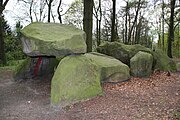 Gretescher Steine |
Gretesch (Osnabrück) | 920 | |
| 2 | Großsteingrab Jeggen |  Großsteingrab Jeggen |
Jeggen (Bissendorf) | 922 | |
| 3 a | Driehauser Steine |  Driehauser Steine |
Darpvenne (Ostercappeln) | 903 | |
| 3 b-d | Darpvenner Steine I-III |  Darpvenner Steine I  Darpvenner Steine II  Darpvenner Steine III |
Darpvenne (Ostercappeln) | 900–902 | |
| 4 a–c | Süntelstein Großsteingräber bei Vehrte |
 Süntelstein  Teufels Teigtrog  Teufels Backofen |
Vehrte (Belm) | 915–916 | Devil's Oven (Teufels Backofen) |
| 5 | Helmichsteine | 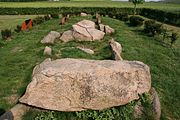 Helmichsteine |
Rulle (Wallenhorst) | 908 | also known as Gevasteine |
| 6 a–b | Östringer Steine |  Oestringer Steine I  Oestringer Steine II |
Nettetal (Osnabrück) | 912–913 | In Östringen is another grave site (Östringer Steine III), which is not part of the Route's inventory |
| 7 a–b | Karlsteine |  Große Karlsteine  Kleine Karlsteine |
Haste (Osnabrück) | 909–910 | |
| 8 | Wiemelsberger Steine |  Wiemelsberger Steine |
Ueffeln (Bramsche) | 897 | |
| 9 a–f | Großsteingräberweg Giersfeld |  Reinecke  Meyer  Grumfeld West  Rickelmann I |
Westerholte (Ankum) | 891–896 | |
| 10 a | Großsteingrab Restrup und Näpfchenstein „Teufelsstein“ |  Näpfchenstein |
Restrup (Bippen) | 886 | |
| 10 b | Hekeser Steine |  Hekese, Grab B |
Hekese (Berge) | 883–884 | In Hekese are two megalithic tombs, which are associated with a stone row. |
| 11 | Großsteingrab im Alt-Frerener Forst |  Großsteingrab im Alt-Frerener Forst |
Freren | 875 | |
| 12 a | Großsteingrab in der Kunkenvenne |  Großsteingrab in der Kunkenvenne |
Thuine | 874 | |
| 12 b | Großsteingrab auf dem Radberg | 
|
873 | ||
| 13 | Der Steinerne Schlüssel |  Der steinerne Schlüssel |
Apeldorn (Meppen) | 852 | The Exhibition Centre for the Archaeology of the Emsland is in Meppen. |
| 14 a–d | Großsteingräber Deymanns Mühle I-IV |  Großsteingrab Deymanns Mühle I  Großsteingrab Deymanns Mühle II 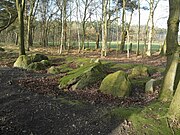 Großsteingrab Deymanns Mühle III  Großsteingrab Deymanns Mühle IV |
Stavern (Sögel) | 848–851 | |
| 14 e | Großsteingrab am Osteresch |  Großsteingrab am Osteresch |
Stavern (Sögel) | 847 | |
| 14 f | Großsteingrab Groß-Stavern 1 |  Bruneforths Esch in Stavern |
Stavern (Sögel) | 846 | The grave Groß-Stavern 1 is also known as Bruneforths Esch. |
| 15 a | Großsteingrab bei den Düvelskuhlen |  Großsteingrab bei den Düvelskuhlen |
Sögel | 831 | |
| 15 b | Hünenbett bei den Düvelskuhlen | Sögel | 832 | ||
| 15 c | Großsteingrab Püttkesberge |  Großsteingrab Püttkesberge |
Sögel | 833 | |
| 16 a–e | Hünengräberstraße des Hümmling |  Großsteingrab Im Ipeken  Großsteingrab Groß Berßen IV  Großsteingrab Groß Berßen VI (Wappengrab)  Großsteingrab Groß Berßen VIII (Königsgrab)  Großsteingrab Groß Berßen VII reconstructed |
Groß Berßen | 856–861 |
|
| 17 a | Volbers Hünensteine |  Volberts Hünensteine |
Hüven | 842 | |
| 17 b | Großsteingrab Hüven-Süd |  Großsteingrab Hüven-Süd |
Hüven | 843 | |
| 17 c | Großsteingrab Lähden I |  Großsteingrab Lähden I |
Lähden | 866 | |
| 18 a | Steenhus in den Klöbertannen | Werpeloh | 822 | Originally, station no. 18 a had been the Großsteingrab am Kölkesberg (Spr.-No. 838).[17] | |
| 18 b | Großsteingrab in den Klöbertannen |  Großsteingrab Werpeloh II |
Werpeloh | 823 | Originally, station no. 18 b had been the Großsteingrab an der Kölkesdose (Spr.-No. 837).[18] |
| 18 c | Großsteingräber auf der Buschhöhe |  Großsteingrab Werpeloh IV |
Werpeloh | 825-826 | |
| 18 d | Steenhus von Börger |  Steenhus von Börger |
Börger | 819 | |
| 19 | Ganggrab von Ostenwalde |  Ganggrab von Ostenwalde |
Ostenwalde | 835 | 70 Meter from the original location. In Ostenwalde are two more Megalithic tombs which are not part of the Route's inventory. |
| 20 a | De hoogen Stener |  De hoogen Steener in Werlte |
Werlte | 830 | |
| 20 b | Poldenhünensteine |  Poldenhünensteine in Harrenstätte |
Spahnharrenstätte | 829 | |
| 21 | Teufelssteine (Molbergen) |  Teufelssteine |
Peheim (Molbergen) | 959 | |
| 22 a | Schlingsteine |  Schlingsteine |
Lindern-Neuenkämpen | 961 | |
| 22 b | Großsteingrab Hünensteine |  Hünensteine |
Lindern-Herrensand | 962 | |
| 22 c | Großsteingrab am hohen Stein und der hohe Stein |  Garen, am hohen Stein  Garen, der hohe Stein |
Lindern-Garen | 963–964 | The Giant's Tomb and High Stone are also known as Garen megalithic tomb. |
| 23 | Oldendorfer Hünensteine |  Oldendorfer Hünensteine |
Oldendorf (Lastrup) | 968 | |
| 24 a | Visbeker Bräutigam |  Visbeker Bräutigam 934  Visbeker Bräutigam 935  Visbeker Bräutigam 936 |
Großenkneten | 934–938, 939–940 | |
| 24 b | Heidenopfertisch |  Heidenopfertisch |
Engelmannsbäke (Visbek) | 974 | |
| 24 c–d | Ahlhorner Kellersteine |  Ahlhorner Kellersteine I  Ahlhorner Kellersteine II |
Ahlhorn (Großenkneten) | 939–940 | |
| 25 a–c | Kleinenknetener Steine |  Kleinenkneten I  Kleinenkneten II  Kleinenkneten III |
Kleinenkneten (Wildeshausen) | 957–958, 947 | The third grave (station 25 c) was originally in Dotlingen and was moved in the 1930s to Kleinenkneten. |
| 26 | Pestruper Gräberfeld |  Pestruper Gräberfeld |
Pestrup (Wildeshausen) | – | Also known as Grabhügelfeld (Grave mound field). |
| 27 a | Hohe Steine |  Hohe Steine |
Wildeshausen | 956 | |
| 27 b | Bargloyer Steinkiste |  Bargloyer Steinkste |
Bargloy (Wildeshausen) | – | This monument has no Sprockhoff No. |
| 28 a | Visbeker Braut |  Visbeker Braut |
Aumühle (Wildeshausen) | 952 | |
| 28 b | Große Steine bei Thölstedt |  Große Steine bei Thölstedt |
Thölstedt | 953 | |
| 29 a–b | Reckumer Steine |  Großsteingrab Reckum I  Großsteingrab Reckum II |
Winkelsett (Harpstedt) | 811–812 | |
| 30 a | Gerichtsstätte |  Großsteingrab Gerichtsstätte |
Dötlingen | 945 | |
| 30 b–d | Glaner Braut |  Glaner Braut I  Glaner Braut II  Glaner Braut III  Glaner Braut IV |
Glane (Wildeshausen) | 948–951 | |
| 30 e | Großsteingrab am Schießstand (Dötlinger Steingrab) |  Großsteingrab am Schießstand (Dötlinger Steingrab) |
Dötlingen | 944 | |
| 31 | Großsteingrab Steenberg |  Großsteingrab Steenberg |
Kirchhatten | 926 | Also called „Hatten 2“; more than 30% of stones seem to be in the original position. |
| 32 a–b | Hünensteine von Steinkimmen |  Hünensteine I  Hünensteine II |
Steinkimmen (Gemeinde Ganderkesee) | 927–928 | Nearby there is a third grave (Steinkimmen Hünensteine III, Sprockhoff no. 929) that is not part of the route inventory. |
| 33 | Große Steine von Stenum |  Große Steine von Stenum |
Stenum (Ganderkesee) | 930 |
Organisation and financing
The Straße der Megalithkultur is a community project resulting from collaboration between:
- Emsland Touristik GmbH[19]
- Landkreis Vechta
- Museum am Schölerberg Osnabrück - Natur und Umwelt, Planetarium[20]
- Niedersächsisches Landesamt für Denkmalpflege[7]
- Oldenburg Tourismus und Marketing GmbH
- Stadt- und Kreisarchäologie Osnabrück[21]
- Tourismusverband Osnabrücker Land e.V.
- Zweckverband Erholungsgebiet Thülsfelder Talsperre
- Zweckverband Naturpark Wildeshauser Geest
Authorised by the Behörde für Geoinformation, Landentwicklung und Liegenschaften (Department of Geoinformation, Land Usage and Property), financing for the Route of Megalithic Culture is provided from EU funds, distributed to local tourism and district authorities.
In May 2011, at the request of the tourism office for Osnabrück county (Landkreis) the tourism promotion department of the Ministry for Economic Affairs provided a subsidy of €180,600 for the route.[22]
References
- ^ "Station 32 description" (PDF). Retrieved 26 July 2013.
- ^ The European Route of Megalithic Culture at culture-routes.net. Retrieved on 9 April 2017.
- ^ Molbergen — Devil’s Stones On The Route of Megalithic Culture at www.mygermancity.com. Retrieved on 27 Jul 2013
- ^ The Route of Megalithic Culture: prehistoric times captured in stone at www.germany.travel. Retrieved on 27 Jul 2013
- ^ The Project Archived 2013-11-04 at the Wayback Machine at www.megalithicroutes.eu. Retrieved on 27 Jul 2013
- ^ a b "Willkommen auf der Straße der Megalithkultur" (in German). Tourismusverband Osnabrücker Land e.V. Retrieved 26 July 2013.
- ^ a b "Straße der Megalithkultur wird am 14. Mai 2009 offiziell eröffnet". Landkreis-Kurier (in German). Archived from the original on August 5, 2013.
- ^ "Straße der Megalithkultur" (in German). Zweckverband Naturpark Wildeshauser Geest.
- ^ a b "News about the Megalithic Routes initiative under the Council of Europe". Megalithic Routes e.V.
- ^ http://www.strassedermegalithkultur.de/
- ^ Emsland Touristik/Recreatieschap Drenthe: Mystisches SteinReich ohne Grenzen Seite 7 Archived 2013-11-01 at the Wayback Machine (pdf; 561 kB)
- ^ Gerret von Northeim: Route zu den Großsteingräbern. Nordwest-Zeitung of 24 March 2009.
- ^ Brief information by the parish of Ostercappeln about the Route of Megalithic Culture
- ^ Leaflet on the Route of Megalithic Culture
- ^ Sites in the Local Area, (in German). Retrieved on 28 Jul 2013
- ^ "33 Stationen der Megalithkultur in Nordwestdeutschland". Tourismusverband Osnabrücker Land e.V. 2011. Retrieved 27 July 2013.
- ^ Annette Bußmann: Steinzeitzeugen. S. 71–72.
- ^ Annette Bußmann: Steinzeitzeugen. S. 72.
- ^ Homepage der Emsland Touristik
- ^ Homepage des Museums am Schölerberg
- ^ Stadt- und Kreisarchäologie in Osnabrück
- ^ DÜRR, CHRISTIAN (1 May 2011). "180.600 Euro für "Megalith-Straße"". Nordwest Zeitung. Retrieved 5 June 2011.[permanent dead link]
- Ernst Sprockhoff: Atlas der Megalithgräber Deutschland. Teil 3: Niedersachsen – Westfalen. Rudolf Habelt Verlag, Bonn, 1975, ISBN 3-7749-1326-9, S. 129–130.
- Annette Bussmann: Steinzeitzeugen. Reisen zur Urgeschichte Nordwestdeutschlands. Straße der Megalithkultur. Herausgegeben von Arbeitsgemeinschaft Straße der Megalithkultur, Isensee, Oldenburg, 2009, ISBN 978-3-89995-619-1.


